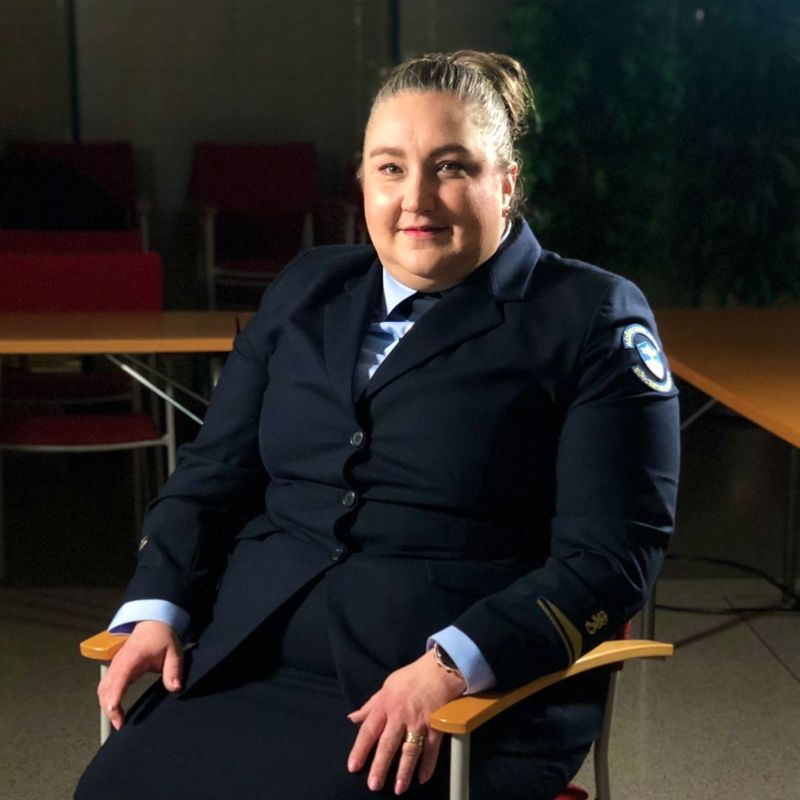Emergency response centre duty officer
"The best part of my work is successful cooperation with both the authorities and the help recipients. For example, calls during which you manage to help a mother in labour and hear the baby cry at the end of the call, or when the police reaches a drunken driver before they cause harm to others, give experiences of success."

- Niina Sairila
- Emergency response centre duty officer at the Emergency Response Centre Agency.
- Graduated as a nurse from Helsinki Polytechnic Stadia and as a practical nurse from Vantaa Vocational College.
- One year of work experience in the field.
Briefly explain what you do for a living.
I work as an emergency response centre duty officer at the Turku Emergency Response Centre, where my task is to answer emergency calls.
How have you ended up in the profession of your choice?
I have previously worked as a nurse and practical nurse, but I have always dreamt that one day I would work as an emergency response centre operator.
Describe your typical working day or week.
My main task is to answer calls and notify the necessary authorities and rescue units of an emergency. The workdays vary greatly because you never know what kind of calls you have to answer. For example, a call may come from a person who has had a seizure or from someone who has come to the scene of an accident to help. It is my duty to ensure that help is provided on time and to give the caller instructions on how to act in the situation.
The work is very independent, but I am never alone at the workplace, as the shift supervisor, superior officers and other emergency response centre duty officers also work in the same room. They will support and help me, whenever necessary. On busy days, I don't have much time to talk with the colleagues.
What kind of work environment or working hours do you have?
I work in the duty room, and my shift lasts 10–12 hours. I have three consecutive workdays, followed by a so-called sleeping day and two days off. The three-day work period starts with a morning shift, followed by a day shift and lastly a night shift. I often also work on holidays, but employees are treated, for example, with Christmas meals and May Day doughnuts.
What kind of competence or qualities are required in the profession?
The work of an emergency response centre duty officer requires the ability to listen and remain calm, as well as the ability to withstand pressure and make independent decisions. If necessary, you must be able to give instructions very firmly but appropriately.
What is the best thing about your profession?
The best part of my work is successful cooperation with both the authorities and the help recipients. For example, calls during which you manage to help a mother in labour and hear the baby cry at the end of the call, or when the police reaches a drunken driver before they cause harm to others, give experiences of success.
What are the downsides of the profession or what seems challenging?
The emergency response centre duty officer must answer calls in which not everything ends well or face evil things which are difficult to understand and handle. You will also get negative feedback. At those moments, you have to remember that you have done your best and you cannot save everyone. The end result is not necessarily due to the professional skills of the emergency response centre duty officer, but to the seriousness of the situation. Older callers also sometimes pose challenges in the work.
What would you tell a person considering the profession of a emergency response centre duty officer?
You should consider, whether you are prepared to move to another city because of work. There are only six emergency response centres in Finland, and at the time of graduation, work may not be available in the nearest centre. It is also worth considering, whether your own life situation is such that you are capable of challenging and mentally demanding work. You must know how to take care of your own well-being, so that bad experiences aren't troubling your mind in your free time. In addition, three-shift work and long workdays require adaptability. Work shifts will affect your private life, as it is not always possible to fulfil everyone's wishes in shift planning.
How do you see the future of your profession?
In the future, emergency situations can also be reported via messages, as young people in particular would like to use messages and send images. Personally, I hope that I can continue to communicate with the callers by speaking.
